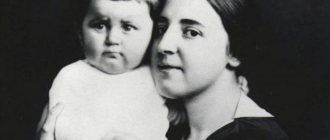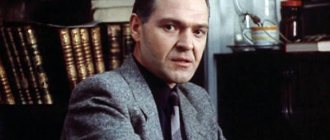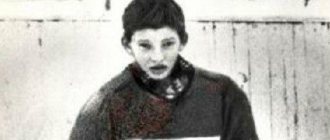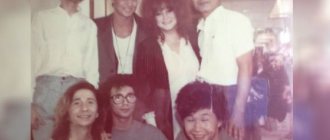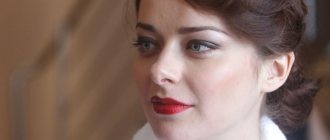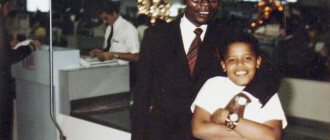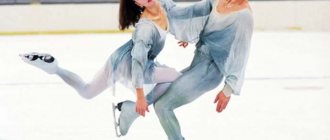Several generations of our compatriots were brought up on the work of Bulat Okudzhava. This brilliant man was able to personify an entire era, accustoming his fans to a new perception. Of course, the bright professional activity of this extraordinary person could not be reflected in his stormy personal life, which was filled with many romantic relationships and two official marriages.
The popular bard was born on May 9, 1924 in Moscow, and died on June 12, 1997 in France. His parents are Shalva Stepanovich Okudzhava and Ashkhen Stepanovna Nalbandyan. Children: Bulat Bulatovich Okudzhava and Igor Bulatovich Okudzhava.
First love
The debut cardiac arrhythmia, associated with the romantic interest of the growing Bulat, occurred in the fourth grade of high school and related to classmate Lela, who did not react at all to the awkward advances of the modest boy. It was a real shock for him to learn from his parents about a transfer to another school, because all his thoughts were connected only with the “girl of his dreams.”
After his own photograph with the caption “Lele from Bulat” was unrequitedly sent to his old school, the unrequited boy in love went on a date with his sweetheart. According to Olga Nikolaevna Meleshchenko herself, recalling this scene many years later, she “almost fainted” when, during a history lesson, she saw a “familiar face” through the window.
Their meeting after school took place 60 years later, when they visited the literary club “By Candlelight” in Nizhny Tagil. It is interesting that Okudzhava did not recognize Olga Nikolaevna at the time, but after her introduction he was very moved. Over the next three years before his death, he wrote nine letters to his former lover, thus maintaining until the last the connection with her established since childhood.
Creation
Bulat Okudzhava wrote about two hundred original and pop songs based on his own poems and Caucasian folk tales (epics).
| “We need one victory” - Nina Urgant, music. Alexandra Pakhmutova, words by Okudzhava |
Works
- Autobiographical anecdotes;
- Aphorisms;
- Poor Avrosimov;
- Be healthy, student;
- Girl of my dreams;
- The art of cutting and living;
- Unexpected joy;
- Brand new, brand new;
- Isolated failures among continuous successes;
- Songs;
- The Adventures of Shipov, or Vintage Vaudeville;
- Lovely adventures;
- Adventures of a Secret Baptist;
- Amateurs' Journey;
- Date with Bonaparte;
- Poems;
- Haaz has no refusal;
- Abolished theater;
- Music lessons;
- The morning is painted with gentle light;
- The private life of Alexander Pushkin, or the Nominative case in the works of Lermontov.
B. Sh. Okudzhava dedicated his songs to the Soviet and Russian theater and film actress Zhanna Andreevna Bolotova:
- "Old jacket";
- “On the Smolensk Road”;
- “The flame burns, it does not smoke”;
- "Small woman".
Poems
An hour of morning work, evening love, autumn time for reflection, winter time for cheerfulness... The whole world is made of restrictions, so as not to go crazy with happiness.
***
Separation is such a thing: without expecting anything, we flinch not from the knock, but from the hope of it.
***
Judge yourself first, learn this art, and then judge your enemy and your neighbor on the globe.
First learn to yourself not to forgive a single mistake, and then shout to your enemy that he is an enemy and his sins are serious.
Defeat the enemy not in others, but in yourself. And when you succeed in this, You won’t have to play the fool anymore - So you will become a man.
***
The story of our life is instantaneous, such a short period, a small step, and we are no longer the same... But conscience, conscience, conscience, conscience in any period of our day, although it is a prejudice, must be kept pure.
For this, no matter what you say, so that everything turns out fairly, as destined, from A to Z, pay, dear ones, pay without loud words and without strain, according to the will of a passionate impulse, without tears, without hiding your heart.
Fantastic love
In the Great Patriotic War, for which he volunteered, the famous bard was seriously wounded, after which he was discharged. After the execution of his father as an “enemy of the people” based on a false denunciation and the subsequent arrest of his mother, Bulat came to the capital, where he met a girl named Valya on the Arbat. Fatefully, the story of first love was repeated in detail. The owner of a radiant smile accepted advances, flirted and in the end gave her girlish preference to Bulat’s acquaintance.
The talented young man even wrote poems in honor of his heartfelt addiction, which he would not publish anywhere later, considering them too personal.
“Your heart is like a window in an abandoned house,
Locked it tightly, now it’s no longer close...
And I followed you because I was destined to
I am destined to search for you around the world...”
And Valentina will carefully preserve them, and, having later become a famous TV presenter, will often remember their fiery author, who became a symbol of the post-war generation. As time passed, Okudzhava could not even imagine that “Aunt Valya from TV” was his post-war love. And half a century after the breakup, he gave her the author’s collection of poems, in which he made a memorable inscription: “How many things could have been different...”.
Songs written for films
In 1962, Bulat Shalvovich participated in filmmaking for the first time: he performed the song “Midnight Trolleybus” of his own composition in a film called “Chain Reaction.” National fame came to Okudzhava in 1970, after the release of the film “Belarusian Station”, which featured the composition “And now we need one victory” - one of the best in his work. Okudzhava later said that when the director invited him to write a song for this film, he initially refused.
It was necessary not only to create a composition, but to stylize the text as a poetic work of the period of the Great Patriotic War, since, according to the plot, it was supposed to be performed by an ordinary soldier, a front-line poet sitting in a trench, composing simple lines about his friends, and not a professional. This task seemed very difficult to Bulat Shalvovich, since he always wrote about the war from the position of a person who already lives in peacetime, but at the front they thought, spoke, and sang differently. However, memory suggested musical intonation and the right words. After this experience, Bulat Shalvovich became the author of many popular songs created for more than eighty films.
First wife
After the capital's heartfelt history, Bulat Okudzhava left for Tbilisi, where he received a pedagogical education at a local university and then began working as a teacher. Having met Galina Smolyaninova during his student years, he did not think long about the need to start a family and went with the girl to the registry office. According to the bard himself, Galya was able to give him the home comfort and care that was so lacking. After all, the young man who lost his parents at an early age really needed warmth and a home.
The wife insisted that the talented author set his poems to music. And she herself was an excellent vocalist. At this time, the happy newlyweds were preparing to become parents. However, the daughter who was born soon died, and the marriage was seriously damaged by this tragic event. Bulat and Galina could not even be helped by the birth of their son Igor.
Already a famous poet, Okudzhava moved his family to Moscow, where he and his wife often attended various literary events. However, such an artificial approach to the pressing problem could not save their marriage. And after the bard’s meeting with Olga Artsimovich, this marital union, as they say, was given a long life.
Second wife
The girl, who dedicated herself to science, knew practically nothing about Okudzhava. However, from the first meeting I was amazed by his genius. And the next day there was a meeting at the Central House of Writers, where they talked incessantly for several hours, feeling spiritual closeness in each other. Interestingly, that same evening Bulat proposed marriage to Olga.
Soon he divorced Galina, and Olga left her husband. They decided to live in the city on the Neva. But a year later, the serene family happiness was disrupted by the sad news of the death of his ex-wife. Bulat was unable to take his son Igor with him because the relatives of his deceased mother took over guardianship. In addition, the living conditions in the one-room apartment in no way contributed to this development of the situation. After all, Olga has already given birth to a son, Anton.
And Igor, far from his eminent father, grew up as a spineless and weak man who, having associated with bad company, became a drug addict and died at the age of 43 from an overdose. The father survived his son by only a few months.
The youngest son of Bulat Okudzhava decided to follow in the footsteps of his eminent parent. Anton, having matured, became a musical performer, lyricist and composer. And in general, according to eyewitnesses, this marriage was quite smooth and calm.
last love
The meeting with Natalya Gorlenko took place when Bulat Okudzhava was 46 years old, and his chosen one was 26. They met at the Institute of Soviet Legislation, where the young woman worked, and the bard performed a concert program. And their hidden romance began 5 months after the first meeting, when Natalya, having experienced unbearable pain from losing her child after childbirth, in confusion dialed the phone number left earlier by a popular poet and asked for a meeting.
This period of life, associated with the special secrecy of relationships, was characterized by constant dates and trips, during which Okudzhava became the most open and natural. Then the lyrical work “All lovers are inclined to escape…” was written, which fully reflects the general state of the couple in love. Despite the poet’s feeling of guilt before Olga and Natalya, he allowed the owner of a beautiful voice to accompany him at concerts.
It is interesting that “Ptichkin,” as Okudzhava affectionately called his love, often received more applause from the audience than the eminent artist himself. This romantic story was accompanied by bright events, including a seven-year separation, during which Natalya married someone else, gave birth to a child, and even divorced.
However, be that as it may, Bulat Okudzhava died in Paris in the arms of his official wife Olga Artsimovich.
Bulat Okudzhava. “On the street of my destiny”...
Bulat Shalvovich Okudzhava (May 9, 1924, Moscow, USSR - June 12, 1997, Clamart, France) - Soviet poet, composer, writer, prose writer and screenwriter. The author of about two hundred original and pop songs, written to his own poems, one of the most prominent representatives of the genre of art songs in the 1950s-1980s.
Breathes the air, breathes the first grass, reeds while it sways, every song while it is heard, a warm woman’s palm under her head.
He breathes, breathes, but can’t get enough of it. He breathes with his mother - she is the only one he has, breathes with his homeland - she is his only one, cries, suffers, laughs, whistles, and is silent at the window, and sings until dark, and lovingly turns over the pages of his short life.
B. Sh. Okudzhava, “Man”
Bulat Okudzhava was born in Moscow on May 9, 1924 to a family of party workers who came from Tiflis to study at the Communist Academy. Father - Shalva Stepanovich Okudzhava, Georgian, famous party leader, mother - Ashkhen Stepanovna Nalbandyan, Armenian, relative of the famous Armenian poet Vahan Teryan. Bulat was born late in the evening in the maternity hospital on Bolshaya Molchanovka, 5. Now this maternity hospital No. 7 no longer exists, but its building has survived - this is building 2 on Novoarbatsky (formerly Kalininsky) Avenue.
The parents thought about the name for a long time: they read everything with admiration, together they were delighted with “The Picture of Dorian Gray” and decided to name their son in honor of the British handsome man. Okudzhava lived the first month of his life under the name Dorian. Maria Nalbandyan, who came to Moscow to help her daughter in the first weeks after giving birth, called her grandson Darik. Only a month later, when the time came to register the child, Shalva admitted that he began to hear a claim in the name “Dorian” - and suggested the modest but worthy name Bulat. My wife approved. First place of residence - st. Arbat, 43, communal apartment on the 4th floor. Exactly ten years after Bulat, his brother was born, also in May, the twenty-fifth. He was named Victor, he suffered from mental illness, which predetermined his fate, loneliness and separation from almost all his relatives.
Soon after Bulat's birth, his father was sent to the Caucasus to work as a commissar of the Georgian division. Mother remained in Moscow, worked in the party apparatus. In 1929, my father was transferred to Moscow to take courses in Marxism under the Central Committee of the All-Union Communist Party of Bolsheviks. Father was promoted to secretary of the Tbilisi City Committee; Because of a conflict with Lavrenty Beria, he sent a letter to Sergo Ordzhonikidze with a request to send him to party work in Russia. In 1932, he was sent to the Urals as a party organizer to build a carriage factory in the city of Nizhny Tagil. Then Shalva Stepanovich became the 1st secretary of the Nizhny Tagil city party committee and soon sent his family to live with him in the Urals. Bulat began studying at school No. 32. Bulat studied well, but was not an excellent student. Having a good memory, he grasped everything in class, and instead of doing homework, he read a lot.
In 1937, Bulat's parents were arrested, his father was shot on false charges on August 4, 1937, and his mother was exiled to the Karaganda camp, from where she returned only in 1955. After the arrest of his parents, Bulat and his grandmother returned to Moscow. He rarely spoke or wrote about his ancestors and his fate; only towards the end of his life did he write an autobiographical novel, “The Abolished Theater,” where he talks about the hardships of his family. In 1940, Bulat Okudzhava moved to relatives in Tbilisi. He studied and then worked at a factory as a turner's apprentice.
In April 1942, at the age of 17, Okudzhava volunteered for the front. He was sent to the 10th Separate Reserve Mortar Division. Then, after two months of training, he was sent to the North Caucasus Front. He was a mortarman, then a heavy artillery radio operator. He was wounded near Mozdok and subsequently, after recovery in the hospital, was demobilized. On June 20, 1944, he received a certificate of secondary education and from that moment on he lived in Tbilisi forever, and on May 9, 1945 he celebrated his twenty-first birthday here. The certificate issued by the Third Evening School has two A's (Russian language and literature), B's in chemistry, history, drawing (“graphics”) and German, and in algebra and geometry, geography, biology, astronomy, trigonometry, physics and even the constitution USSR - triplets. In June 1945, Bulat entered the Russian department of the Faculty of Philology of Tbilisi University named after Stalin - without any particular problems, as a front-line soldier.
I passed the exams from August 27 to September 1: German oral - C, geography - “good”, history - “good”, Russian and literature (oral and written) - “good”. In February 1947 he married Galina Vasilyevna Smolyaninova (1926-1965). Okudzhava rarely talked about his first wife, he was burdened by guilt towards her and almost did not mention family life in Tbilisi. Why he got married so early, in his second year, is easy to understand: he needed a family, he hoped to find a second home with the Smolyaninovs, but he never ceased to feel like a stranger in this house. Without exception, everyone who writes about his first marriage emphasizes that it was not so easy for the unit’s political officer to approve his daughter’s choice in 1947: to introduce the son of an enemy of the people into the family. Having received his diploma, in 1950 he began working as a teacher - first in a rural school in the village of Shamordino, Kaluga region and in the regional center of Vysokinichi. However, he never became a rural teacher. In 1954, after a meeting between the writer Vladimir Koblikov and the poet Nikolai Panchenko with readers in the Vysokinichsky district, Bulat approached them and offered to listen to his poems. Having received approval and support, he moved to Kaluga, where he began to collaborate with the newspaper “Young Leninist” and in 1956 published his first collection “Lyrics”. In 1956, after the rehabilitation of his parents and the 20th Congress, he joined the CPSU. The marriage began to fall apart long before he and Galina officially divorced in 1964. Everyone who saw Okudzhava and his wife in the late fifties noted their mutual alienation. One thing is beyond doubt: Galina Smolyaninova was a good person, sincere and simple, and she loved her husband recklessly. She collected his poems, admired them, did not contradict him in anything, and in the early fifties in Kaluga she saved his life. For a long time he did not decide to divorce. Perhaps the loss of their first daughter had a strong influence on their relationship. The son from his first marriage, Igor Okudzhava (1954-January 11, 1997), served time in prison, took drugs. On November 7, 1965, Okudzhava’s first wife died of acute heart failure.
In 1959, Okudzhava returned to Moscow. In the same year, he began performing as a songwriter (poems and music) and performing them with a guitar, quickly gaining popularity. The composition of many of Okudzhava’s most famous early songs dates back to this period (1956-1967) (“On Tverskoy Boulevard”, “Song about Lyonka Korolev”, “Song about the Blue Ball”, “Sentimental March”, “Song about the Midnight Trolleybus”, “ Not tramps, not drunkards”, “Moscow Ant”, “Song about the Komsomol goddess”, etc.).
He worked as an editor at the Molodaya Gvardiya publishing house, then as head of the poetry department at Literaturnaya Gazeta. Participated in the work of the literary association "Magistral". In 1961, he left the service and no longer worked for hire, focusing exclusively on creative activities. In 1961, the first official evening of Bulat Okudzhava’s original song on the territory of the USSR took place in Kharkov. In the same year, Okudzhava first appeared on screen in the film “Chain Reaction”, in which he performed the song “Midnight Trolleybus”. For his fellow writers, Bulat formulated a universal criterion of creativity, saying: “Everyone writes as he breathes.”
He was admitted to the Writers' Union on October 24, 1961. Okudzhava made his debut as a prose writer: his autobiographical story “Be Healthy, Schoolboy” was published in the almanac “Tarussky Pages” (published as a separate publication in 1987). Okudzhava’s circle of personal friends included Bella Akhmadulina, Yuri Levitansky, Fazil Iskander.
The second wife is Olga Vladimirovna Okudzhava (village Artsimovich), niece of Lev Artsimovich. In 1962, she graduated from the physics department of Leningrad State University. She already had experience of marriage when Okudzhava, a few days after they met, put his arm around Olga’s shoulders, timidly touched her red hair with his lips and asked: “Will you marry me?” She said, "Yes." He took her first to Tbilisi, to visit friends, and then briefly to Yerevan to show Sylvia. The fact that Olga was immediately accepted by Ashkhen - Bulat's mother - and Sylvia, who tried to replace his mother until her release, was very important for him. This confirmed his choice. And in June he finally moved to Olga, “with a suitcase.” Thus began Okudzhava’s Leningrad period, which lasted from June 1962 until the end of 1965, when he and his wife moved to a house at the River Station.
Okudzhava himself spoke about officially registering the marriage - he wanted to do it as quickly as possible, but he could not divorce Galina: she would have been immediately thrown out of the queue for an apartment in the writer's building. The official divorce took place two years later, when the house was completed and occupied. The apartment provided an office for Okudzhava, but he almost never appeared there. They divorced Galina in November 1964, when Olga had already given birth to Bulat Jr., who with mocking pride called himself a bastard, “the fruit of lawless love.”
Son - Bulat (Anton) Bulatovich Okudzhava (born 1965), musician, composer. It was not easy for Olya and his son to deal with him. Although with those whom he considered his own, he was unusually simple and generous. Creative people, as a rule, are very unadapted in family life. Okudzhava knew how to cook, wash dishes, and drive a nail, and in everything he always unquestioningly obeyed his other half.
“His self-defense was a certain arrogance. In any case, many perceived him that way. But he was surprisingly tender and vulnerable. A soldier is walking down the street - Bulatik could cry. Despite the fact that his character is strong-willed restraint. Yes, there was also sentimentality in him... A poet... I called him “Cloud without pants.” Soft, romantic, impulsive. Of course, he needed a woman like Olga.” - N. Gorlenko.
In 1970, the film “Belorussky Station” was released, in which Bulat Okudzhava’s song “And we need one victory” was performed. Okudzhava is the author of other popular songs for such films as “Straw Hat”, “Zhenya, Zhenechka and Katyusha” (in which Okudzhava sings in a cameo role with a guitar in a soldier’s uniform), etc. In total, Okudzhava’s songs on his poems are heard in more than 80 films. The songs of Bulat Okudzhava, spreading in tape recordings, quickly gained popularity, primarily among the intelligentsia: first in the USSR, then among Russian speakers abroad. The songs “Let’s join hands, friends...”, “While the Earth is still spinning...” (“Prayer of François Villon”) have become the anthem of many PCB rallies and festivals. In addition to songs based on his own poems, Okudzhava wrote a number of songs based on poems by the Polish poetess Agnieszka Osiecka, which he himself translated into Russian. The creative union of Bulat Okudzhava with composer Isaac Schwartz turned out to be very fruitful. Together they created 32 songs, the most famous of which are the song “Your Honor, Lady Luck” (“White Sun of the Desert”), the cavalry guard’s song from the movie “Star of Captivating Happiness”, the romance “Love and Separation” (“We were not married in church "), as well as songs from the movie "Straw Hat". In 1973, Okudzhava learned to drive a car - it was a Zhiguli; Since then, he has updated it twice, but remained faithful to this brand. He drove, according to the recollections of his friends, confidently, quickly, but carefully; I had no idea how the car worked.
Published stories: “Poor Avrosimov” (“A Sip of Freedom”) (1969) about the tragic pages in the history of the Decembrist movement, “The Adventures of Shipov, or Ancient Vaudeville” (1971) and the novels “The Journey of Amateurs” (part 1. - 1976; part 2. - 1978) and “Date with Bonaparte” (1983).
On April 3, 1981, he met singer Natalya Gorlenko (born June 10, 1955). An employee of the Institute of Soviet Legislation, who later became an actress, Natalya was his muse for a long time, which was reflected in his work. “It took a long time before things started in earnest. We considered December 10th to be our day. From that day on, our secret meetings began, our common life, hidden for a time from prying eyes. Then he moved in with me." - N. Gorlenko.
He called her “Ptichkin” - probably because of her last name. And she responded... “The situation was extremely painful for all of us. We both went back and forth many times and tried many options. Apparently, that was the only possible one. He loved guests, he loved to cook. He did it perfectly. On a whim. Favorite dish is cottage cheese casserole. They ate caviar, greens, all kinds of cheeses, and drank cognac. He said that you shouldn’t ask a woman: what are you drinking? You have to ask: will you have vodka or cognac? One of the separations was especially long, we agreed to part.” - N. Gorlenko.
With the beginning of perestroika, Bulat Okudzhava began to take an active part in the political life of the country, taking an active democratic position. Since 1989 - founding member of the Russian PEN Center. In 1990 he left the CPSU. In 1991, Bulat Okudzhava urgently needed heart surgery - the days were counting. The poet was urgently transported to the United States, where the clinic asked for tens of thousands of dollars for treatment. For the Okudzhava family this was a huge amount. The poet's friend Ernst Neizvestny said that the situation was so hopeless that he was even going to mortgage his house to help Bulat. But they were collected not by friends, but by emigrants. They sent some three dollars, some three hundred... The operation was so successful that a month after it Okudzhava refused... glasses.
Okudzhava was never a believer, in the usual sense of the word, just as he was never an atheist—they don’t exist in the trenches. He professed as a religion what are called eternal values. Friends made fun of him, comparing him to Gandhi - Okudzhava really looked like him. On this occasion, the poet himself spoke with a smile about the time when he was lying in a Los Angeles hospital: “... I walk along the corridor and see: Gandhi is walking straight towards me. I can't understand anything. I come closer and it’s a mirror!”
Since 1992 - member of the commission on pardons under the President of the Russian Federation; since 1994 - member of the commission for State Prizes of the Russian Federation. He was a member of the founding council of the Moscow News newspaper, a member of the founding board of Obshchaya Gazeta, a member of the editorial board of the Evening Club newspaper, and a member of the Memorial Society Council. On October 4, 1993, Bulat Okudzhava signed the “letter of forty-two.” Many preferred to be above the fray, but Okudzhava was not one of those who valued reputation above all else. Sometimes saving face means sacrificing this reputation.
In the 1990s, Okudzhava mainly lived at his dacha in Peredelkino. During these years, Okudzhava performed concerts in Moscow and St. Petersburg, in the USA, Canada, Germany and Israel. On June 23, 1995, Bulat Okudzhava’s last concert took place at UNESCO Headquarters in Paris.
Bulat Okudzhava died on June 12, 1997 in Paris (in the suburb of Clamart), in a military hospital after suffering from the flu. In the first days of his illness, Okudzhava was treated by the embassy doctor. But the doctor’s hopes were not justified. Within a few days, Okudzhava’s temperature rose to 39 degrees. Bulat Okudzhava arrived at the Val de Grasse military hospital under his own power - he could still walk. There they performed tests on him and came to the conclusion that the patient had a complex form of pneumonia.
It became increasingly difficult for Okudzhava to breathe, he even stopped sleeping at night. Because of this, he developed a long-standing ulcer. A sixth of the lungs refused to work. On the morning of June 12, Okudzhava’s condition deteriorated significantly, and doctors decided to urgently transport him to the Percy military training clinic near Paris, which specializes in severe forms of pulmonary diseases and has the best equipment. However, it was already too late. At 10 p.m. Moscow time, he died without ever waking up from his coma. As Okudzhava’s wife, Olga Vladimirovna, would later sadly note: “They pulled together all the machine gun tanks, all the angels with prayer services, but all this is already useless. All this should have been done 3-4 days ago.”
Before his death, his wife baptized the poet on his deathbed. Just before his death, Bulat Okudzhava was baptized with the name John in memory of the holy martyr John the Warrior. This happened in Paris with the blessing of one of the elders of the Pskov-Pechora Monastery. They said goodbye to him on Arbat, at the Vakhtangov Theater. He was buried on June 19, 1997 at the Moscow Vagankovskoye cemetery.
The State Memorial Museum of Bulat Okudzhava is located in the Moscow region, in the Leninsky district, p/o Michurinets, village. writers "Peredelkino", st. Dovzhenko, 11, founded on August 22, 1998, opened on October 31, 1999.
On May 8, 2002, the first monument to Bulat Okudzhava was unveiled in Moscow. The monument is installed on the corner of Arbat and Plotnikov Lane. On September 8, 2007, a monument to Okudzhava was unveiled in Moscow in the courtyard of Education Center No. 109. The author of both sculptures is Georgy Frangulyan.
On the street of my misfortune the weather is stormy, the autumn trees are rustling, littering with faded leaves. On the street of my losses, winter reigns for six months: the robber cold of December is getting closer and more inexorable.
On the street of my soul, the snow will sigh, the rain will splash, then suddenly the last village will mysteriously groan in the distance... It’s still dark outside the windows, but the light wing of a timid tit, like a sail, opens and flutters.
On the street of my fate, not everything is sublime and smooth... But the warm walls are stingy masonry?.. But the smoke rings from the chimney?.. But the sound of an undead chimney, even though everything is so ghostly and shaky?.. But that tit, like a mystery, on my street fate?..
Bulat Okudzhava 1991
